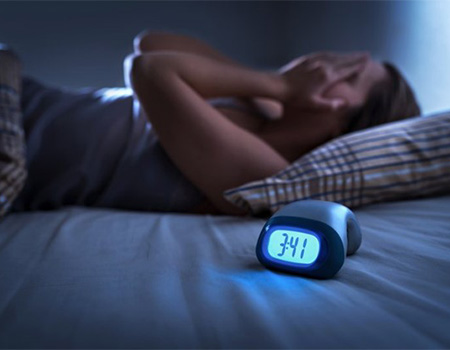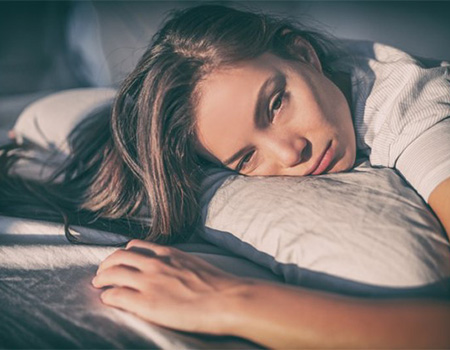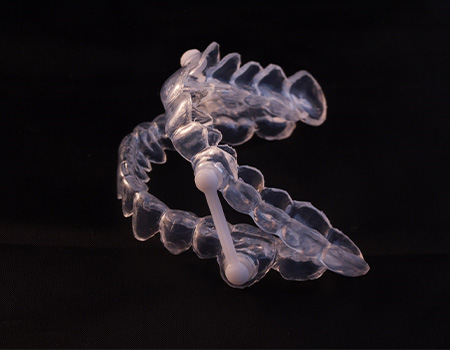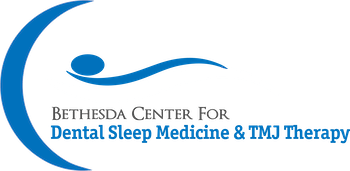Sleep Apnea Therapy – Bethesda, MD
Breathe Easier and Sleep Comfortably

It’s estimated that over 20 million Americans are currently dealing with sleep apnea. While that may seem like a lot, it’s actually a low estimate because about 80% of cases are undiagnosed. Aside from making people feel exhausted, sleep apnea can have a significant impact on your overall health and well-being. But don’t worry – this condition is very treatable! Our team provides sleep apnea treatment to help patients get the care they need while minimizing the risk of other potential issues that can develop over time. If you’d like to find out if you could benefit from sleep apnea treatment, continue reading or schedule a consultation with us today.
What Is Sleep Apnea?

Sleep apnea is an incredibly common disorder that affects millions of people throughout the United States. While there are a few different kinds of sleep apnea, the most common is obstructive sleep apnea (OSA), which happens when your throat muscles become relaxed and ultimately collapse.
This obstructs your airway, preventing adequate airflow and causing you to wake once or even multiple times each night. Since each awakening occurs for a short time, you probably won’t remember it later. Even though your sleep is constantly interrupted, you may not notice until it has already taken a serious toll on your overall health.
Symptoms of Sleep Apnea

Many patients live with sleep apnea unknowingly, not seeking treatment until decades after its onset. Keep an eye out for common symptoms of sleep apnea, which include:
- Loud snoring
- Nighttime choking or gasping
- Daytime drowsiness
- Restless sleep or insomnia
- Morning headaches
- Difficulty concentrating
- Poor memory
- Irritability or moodiness
- Dry mouth or sore throat upon waking
- Frequent trips to the bathroom
- Impotence
The Dangers of Sleep Apnea

Sleep apnea doesn’t just affect your quality of rest – it also negatively impacts your overall quality of life. Most patients experience depression, difficulty remembering things, and extreme drowsiness each day. As you can imagine, these symptoms can significantly affect your personal life and career.
If you suspect you have sleep apnea, make sure you seek treatment right away. The initial symptoms can be combined with problematic conditions developing throughout the body. As a result, your quality of life can suffer greatly, leading to conditions like stroke, heart attack, diabetes, high blood pressure, and even pre-term birth for women who are pregnant.
Sleep Apnea Treatment Options

Don’t worry – you don’t have to suffer from sleep apnea forever! You can undergo treatment with a highly skilled and trained dentist in Bethesda. After a sleep study has confirmed a sleep apnea diagnosis, we’ll explain your treatment options and help you decide on the best method for you. Oral appliance therapy and combined therapy can deliver effective results, allowing you to achieve better sleep in no time at all! You can also make some lifestyle changes (i.e., lose weight, quit smoking, limit alcohol consumption) to help reduce sleep apnea symptoms.
Sleep Apnea FAQs

Did you know that sleep apnea is a prevalent issue that is hardly noticed? If you find yourself waking up from snoring or suspect that you might be experiencing this condition, then you’ll want to seek treatment sooner rather than later. However, it’s normal to want to know as much as you can about the process before committing to anything. That’s why our team has compiled and answered some of our most commonly asked questions about sleep apnea therapy in Bethesda. Keep reading to find out more or give our team a call today to schedule an appointment.
Why Should I See a Dentist for Sleep Apnea Treatment?
While it may not seem obvious at first glance, your sleep dentist has incredible insight when it comes to your upper respiratory area. They can monitor your mouth and neck to see the condition of your airway. If you have obstructive sleep apnea, the tissues in these areas can prevent you from breathing properly. Your sleep dentist can help reposition the lower jaw to allow for the airway to be unobstructed by these tissues. During your regular dental checkups, feel free to inform your dentist about any problems with sleeping so that they can assess your situation and recommend the best approach for addressing it.
Can I Diagnose Sleep Apnea on My Own?
Even if you begin to experience some of the most common symptoms associated with sleep apnea, it doesn’t mean you have this condition. While you might use fancy tech watches or other devices to help monitor your vitals and breathing patterns, they won’t comprehensively test for obstructive sleep apnea. To determine if you’re experiencing this condition, you’ll need to first see a sleep doctor and undergo testing with them to get an official diagnosis. It will be important to know the kind of sleep apnea you may have, that way you’ll know the appropriate treatment for it.
Will Oral Appliance Therapy Make CPAP Therapy Unnecessary?
CPAP therapy is highly effective as it physically forces air to go through your airways via a mask that you wear at night. Although this device is virtually 100% reliable, only about 50% of patients who are prescribed the device actually use it. For a more comfortable and convenient option, some people choose to replace their CPAP therapy with an oral appliance. However, this alternative is only helpful in addressing mild to moderate cases of sleep apnea. If you’re suffering from severe sleep apnea, an oral appliance may not be sufficient alone. Be sure to work with your sleep doctor and dentist to determine the ideal solution for you.
How Soon After Starting Sleep Apnea Treatment Will I Notice Improvement?
It can typically take some time for patients to grow accustomed to using their CPAP therapy, as the noise it makes can be distracting throughout the night. An oral appliance for obstructive sleep apnea, however, can often provide you with better sleep much more quickly. Oftentimes, it only takes about one to two nights to get used to wearing it. That said, you’ll need to take an additional sleep test to determine if an oral appliance is actually working. Should your symptoms start to fade or subside, then it's likely a good indication that it is.
